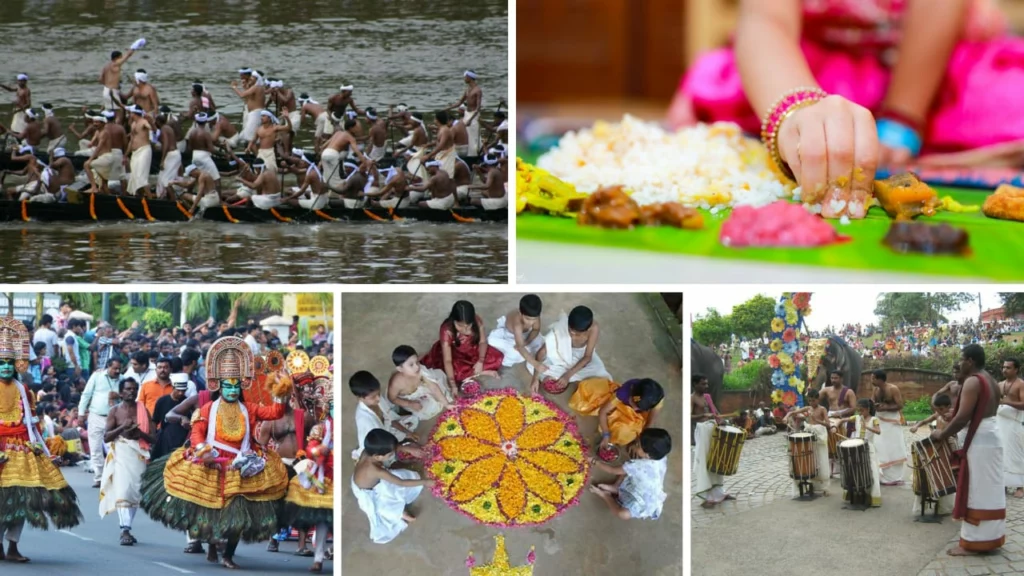Read in : தமிழ்
(This article was first published on Sept 7, 2022)
As Keralites throughout the world are celebrating Onam festival, the cultural festival of Malayalees cutting across caste and religion, a public holiday has been announced in several districts of Tamil Nadu too. Political leaders of Tamil Nadu have greeted Keralites on the occasion.
But, the origin of Onam festival is Tamil Nadu since people in the State had celebrated the festival two thousand years ago. Classical Tamil literature of the Sangam age recorded the Onam celebrations at Madurai, a famous city of the Sangam age. ‘Madurai Kanchi’, a Sangam age poetical work composed by poet Mangudi Marudhanar, describes the festival as the birthday celebrations of ‘Mayone’, one of the five deities mentioned in classical Tamil literature. ‘Madurai Kanchi’ is one of the ten books known as Pathu Pattu.
Madurai Kanchi describes Onam as the good day when Mayone, who defeated ‘Avunar’ (enemies of Tamils) and often wears a beautiful garland, was born. This is the first reference to the Onam festival in any literature including Malayalam literature, since Malayalam did not exist at the time of ‘Madurai Kanchi’, which belongs to the third century AD. The verses say people used to arrange fights between elephants and witnessed the tussle from a higher ground on Onam day.
The book Madurai Kanchi speaks about Pandya king Nedunchezhian belonging to the early third century AD. Besides archaeological evidence, the history and culture of South India can be known from classical Tamil literature two thousand years ago. Sangam literature refers to Kerala as ‘Chera Naadu’, a region where Tamil was spoken. Historians say that Cheran Senguttvan, one of the famous Chera kings, was the grandson of Chola king Karikalan, hailed as the greatest of Chola kings. This lineage of Chera kings ruled what is now Kerala for many centuries.
Classical Tamil literature of the Sangam age recorded the Onam celebrations at Madurai, a famous city of the Sangam age
An interaction between former Tamil Nadu Chief Minister MG Ramachandran and poet Kannadasan can be cited here. When Kannadasan penned the song “Pesuvadhu kiliyaa” for ‘Pana Thottam’, one of MGR’s movies, he added two lines to describe MGR. The lines were “Cheranukku Uravaa? Senthamizhar Nilavaa?” which means “Are you related to Chera kings” Are you the moon for Tamils?” (Chandran, the second part of MGR’s name means ‘moon’ in Tamil).
MGR who thought that Kannadasan through the line ‘Cheranukku Uravaa’ was alluding to MGR’s Keralite origin had asked an explanation for it from the poet. Kannadasan explained to the actor’s satisfaction that Chera kings are Tamils and also pointed to the second line which describes the matinee idol as ‘the moon of Tamils’. This incident was narrated by Kannadasan’s son Kalaivanan in one of his articles
Also Read: Are Malayalis happier than Tamils? Quite possibly
Kerala was one of the Tamil kingdoms during the Sangam age, but none of the Tamil literary works, even those related to Chera country, mentions Onam celebrations. For example, ‘Pathitru Pathu’, a compilation of poems on ten Chera kings do not mention Onam celebrations in Kerala. The great Tamil poet Ilango, who belongs to Chera Naadu (Kerala), has not mentioned anything about Onam festival in the great Tamil epic Silappadhikaram’. Since Onam had been celebrated in Madurai, one of the Tamil kingdoms, the festival must have been part of Pandya culture, two thousand years ago. The festival of Pandyas may have spread to neighbouring Kerala during the course of time.

Onam was celebrated in Madurai, one of the Tamil kingdoms. The festival must have been part of Tamil culture two thousand years ago. (Photo credit: Yupi Harris – Flickr)
‘Madurai Kanchi’ does not mention king Mahabali or Vaamana Avatar when speaking about Onam. It only describes Onam as the birthday festival of ‘Mayone’ the deity belonging to the Mullai region of Tamizhakam. Ancient Tamil literature had divided the land into five geographical areas. The forests, pastoral lands and the area around forests are said to be Mullai land. Mayone is the deity worshipped by Mullai folk.
Another manifestation from Madurai Kanchi is that Krishna Jayanthi, which is celebrated today, was not celebrated as Mayone’s birthday. Recently, Naam Thamizhar leader Seeman had greeted the people, describing Krishna Jayanthi as the birthday of a Tamil deity. But, there seems to be no connection between Mayone and Krishna Jayanthi. According to Sangam literature, Onam is the birthday festival of Mayone, the Tamil deity. So, it can be safely surmised that there is no connection between Tamil deity Mayone and Lord Krishna.
Also Read : Tamils and Malayalees: Let’s talk about the stereotypes
According to the concept of universal connection, one of the basic foundations of dialectics developed by the great German philosopher Friedrich Hegel, “Nothing in the world stands by itself. Every object is a link in an endless chain and is thus connected with all the other links. The life of the universe, its history lies in an infinite web of connections”. As per this dialectical law, it is necessary to analyse the origin and development of any event or object to understand its nature. In this connection, it can be pointed out that an understanding of classical Tamil literature helps one to have an understanding of the origin and development of South Indian culture, history and people’s life.
Read in : தமிழ்
